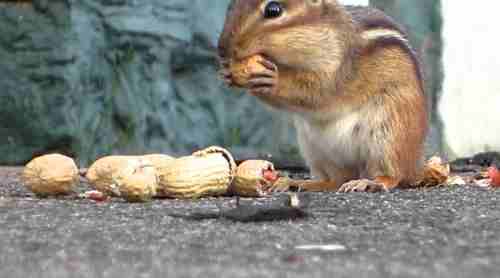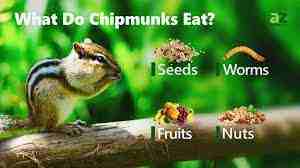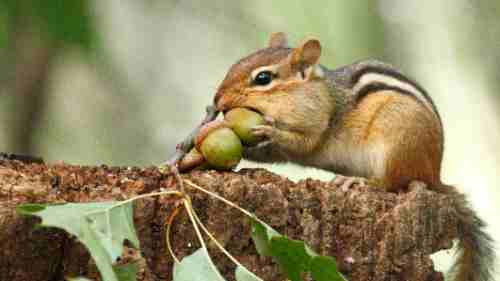Chipmunks are adorable little creatures that may appear in your yard occasionally.
Many people also take chipmunks to be petted. They are amusing due to their lively nature and cute personalities.
Chipmunks are closely related to squirrels. Both animals have similar appearances, with minor variations. They may share some of their behavioral behaviors as well. Like ground squirrels, chipmunks dig into the earth to provide refuge. Similar to observing one or two squirrels in your backyard, you may also see chipmunks in the garden.
Chipmunks’ presence around your garden may indicate their quest for food. Wild chipmunks rely on food objects they may encounter in their natural habitat. In contrast, chipmunks kept as pets enjoy an entirely different diet.

The eating habits of Chipmunks
Chipmunks are omnivores in essence. They consume both animals and plants. Their diet, therefore, is naturally full of varieties. They mainly eat seeds and nuts, insects, different kinds of grains, eggs of specific birds, as well as tiny birds (rarely) and various kinds of worms and fungi, grasses and plants, and raw fruits and vegetables.
Chipmunks also require small insects as part of their diet. This includes larvae, mealworms and crickets, and grasshoppers. As they hunt for these creatures in their natural habitats when they are pet chipmunks, ensure that there aren’t any insecticides or pesticides on the plants they consume. This could be extremely harmful and could even kill them.
What do chipmunks eat when they are in the garden?
If you’re thinking about having a chipmunk as an animal, or you’re contemplating what to feed this constant visitor to your yard, it is vital to offer your animal a food plan close to what they would eat outdoors as you can. Knowing what kind of food is readily available to chipmunks is essential. Apples, pears, bananas, carrots, and oranges are all offered for your dog’s chipmunk.

But, some think that the presence of a chipmunk in your garden can be dangerous. There isn’t any evidence to support this. Chipmunks seldom cause harm to property, but when they gather seeds and fruits, they can cause damage to beautiful flowers. Chipmunks can dig up spring-blooming bulbs and burrow into flower beds, walkways, and even on porches. But, there are no reports of chipmunks digging holes that cause structural damage to structures.
What do Chipmunks Consume In the Wild and as Pets?
While technically rodents, there are not many creatures so adorable as chipmunks. It’s not surprising that this is why lots of people would like to keep these cute animals as pets.
Many people, however, don’t know what they eat, and it turns out that being able to feed animals is a significant element of keeping a pet. Many people believe that they consume acorns. However, it’s not the only food source in their diets.

In this article, we’ll look at chipmunks’ food habits when left to their own devices, as well as what you can expect to feed them if they depend on you for their meals. Although there are 25 species of chipmunks, they’re all very alike in their diet, so the tips below should apply to almost all chipmunks you bring home.
Natural feeding behavior
While they are primarily woodland dwellers and skilled climbers, wild chipmunks prefer to live in caves underground or hollow logs of trees or even in nests made of dense bush.
Chipmunks are nocturnal and are primarily active during dawn and dusk. This is because there aren’t many predators to menace their lives. Between napping and resting, the nocturnal creatures have a lot of time exploring the earth; however, they can also climb trees to feed on nuts and acorns. According to National Geographic, a single chipmunk could gather as many as 165 acorns one day!
If you’ve been asking, “Do chipmunks eat acorns?” the answer is undoubted yes. Instead of sitting out in the open, where they are susceptible to attack, chipmunks prefer to gather food and bring them back home to their den. They also put food items in their caves like nuts and return to find their treasures later.
Chipmunk Hibernation
The chipmunks hibernate in winter; however, they don’t stay in bed throughout the entire season. They go to their caves but come out every few days, bring their body temperature to be expected, consume stored food instead of the fat stores, and then urinate and excrete.
In the deep sleep phase of hibernation, they can be complicated to awaken. Their heart rate drops from around 350 beats per min to maybe 4. The body’s temperature can fall from 94 degrees F up to whatever the burrow’s temperature is — as frigid as 40 F.
What do baby Chipmunks Consume?
Little chipmunks, also called pups, were born blind and weighed roughly the same size as beans. For the first few months, baby chipmunks depend on the milk of their mothers and food sources to live. In about two months, chipmunks are old enough to explore independently. If you’re caring for a young chipmunk, you could feed it a baby milk replacement. It is usually available at your vet’s office or a local pet retailer. Once your baby chipmunk is about one month old, you may begin feeding them soft solid food. Start with soft fruits, such as apples, or fruit like berries. You could also introduce softened pellet formulas that are suitable for rodents. At some point, you’ll be able to include items like seeds, nuts, and vegetables in the diet of your baby chipmunk. In the end, it should comprise 50 percent grains and nuts and 35% to 40 fruit and vegetables, and 10 percent to 15 percent rodent supplements.
What Can You Give Your Chipmunk?
Although chipmunks aren’t the most popular pet, they’re increasing in popularity because they’re both cute and friendly in captive environments. When you bring one home, however, make sure you are aware of what you feed them because although chipmunks don’t have a preference, there are certain foods they prefer to eat over others.
They’ll be good to go if you supply them with plenty of diversity. The most important thing is to ensure they are not in their natural habitat.
Monitoring your chipmunks’ diet
It is essential to be aware of the quantity and kind of food your chipmunks eat daily and ensure whether they’re drinking water as usual and releasing plenty of dry droplets. Most chipmunks have two types of droppings: dry and complex and soft, moist pellets they consume right from their stomachs. They’re an essential component of their food!
If you choose to modify your pet’s diet to enhance their health, that’s great! Remember that you should not make sudden changes to your pet’s diet because this can upset their digestive system and cause them to be sick. Talk to your vet for more specific guidance on slowly moving your pet’s diet to an improved diet.
If your chipmunk’s drinking or eating habits alter, or the amount or size of their droppings decreases, speak to your veterinarian, as they may be suffering from illness.
What are chipmunks eating – A summary
Chipmunks are extremely omnivores and consume many different kinds of vegetables, fruits, seeds, nuts, and live food. It is essential to duplicate this kind of diet as closely as possible with your chipmunk pet.
Ensure your chipmunks have hard-shelled nuts and hardwood to gnaw on to ensure your pet’s front teeth of their incisors are worn down.
They are a bit snobby about meals, however! Their love for nuts and seeds might inspire female or male chipmunk names. We’re sure that you’ll come up with some exciting names.
Tell us about your pet chipmunks. What are your favorite chipmunks’ food items?
Tell us about it in the comments below!